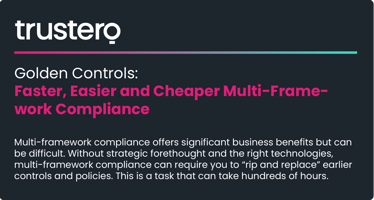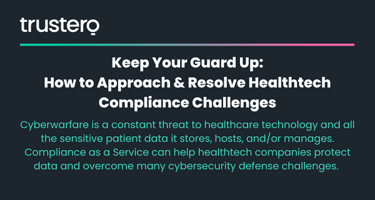You’re a decision-maker at an SMB or emerging enterprise facing pressure to comply with SOC 2. And...
SOC 2 Compliance: Trends to Watch
SOC 2 and other business and technology management frameworks evolve in response to changes in multiple arenas, from technology to government and politics. Several trends in privacy, risk management, security, and other areas will likely affect your journey to sustained SOC 2 compliance in 2022 and beyond.
More global privacy and security regulations.
The General Data Protection Regulation (GDPR) adopted by the European Union (EU) increased data protection and user privacy, even for EU citizens living abroad. The fines for non-compliance with the GDPR are steep. In 2021, fines levied against Amazon, Google, and WhatsApp totaled more than $1.3 billion. According to enforcementtracker.com, total GDPR non-compliance fines have averaged more than €22 million in the first three months of 2022. A 2021 study found that organizations lose an average of $4 million in revenue from a single non-compliance event.
The GDPR has spawned similar regulations around the world. In the United States, California, Colorado, and Virginia passed new privacy protections, and others are planning or considering new laws. Beyond steep fines, violations can cause significant damage to reputations. Keeping up with evolving regulations will challenge every business pursuing sustained SOC 2 compliance.
More effort to break down silos in risk and compliance management.
Compliance with SOC 2 and other frameworks and regulations intends to reduce risk and optimize its mitigation across your business. In addition, modern risk and compliance management policies, processes, and technologies are increasingly bringing these disciplines closer together, reducing or eliminating duplication of efforts and data incompatibilities.
Evolving work-from-home, work-from-anywhere, and return-to-work policies.
According to an April 2021 report in The Economist, “Before the pandemic, Americans spent 5% of their working time at home. By spring 2020, the figure was 60%.” Ensuring consistent SOC 2 compliance within and beyond company premises is as challenging as ensuring consistent cybersecurity among premise-based and nomadic users. Compliance leaders must work closely with their counterparts in HR, IT, and Legal to ensure compliance mandates are aligned with corporate policies and worker rights.
More focus on continuous compliance.
Compliance automation solutions increasingly incorporate artificial intelligence (AI) and machine learning (ML) technologies. These and other modern technologies help to enable continuous monitoring, rapid notification of non-compliant events, and even predictive recommendations to sustain compliance continuously and demonstrate it on demand. Therefore, you should ensure your chosen compliance automation solution includes features that can support continuous compliance for your business.
More involvement of users in risk recognition and mitigation.
With cybersecurity and privacy, users are both a common target for threats and attacks and a potentially powerful first line of defense against them. As a result, compliance and risk managers are increasing their efforts to educate users about the importance of their roles and actions in achieving and sustaining compliance and reducing risk.
More and better data.
Compliance and risk managers and compliance automation solution providers are increasingly focused on improving the quality, timeliness, and security of compliance- and risk-related data, including more comprehensive and automated evidence gathering and analysis.
More integration of data governance and compliance.
The ability to achieve and sustain compliance is directly affected by the quality and timeliness of compliance-related data. This argues for greater unification of compliance and data governance efforts to provide a more complete and accurate picture of a company’s overall compliance posture.
Future Trustero blog posts and “Everything Compliance” interviews will delve into these and other trends affecting the evolution of compliance with SOC 2 and other frameworks and regulations. If there are particular topics you’d like to see addressed here, send an email to marketing@trustero.com – and keep reading and watching.


